'Bodies everywhere.' Venezuelan migrants now on Cape Cod recall horrors fleeing to America
BARNSTABLE — In the summer of 2022, Katiuska, 31, slowly made her way through the Darien Jungle — a dense, mountainous rainforest that rests between Colombia and Panama. Trained as a nurse, the Venezuelan native stopped occasionally to help the dead and the dying. "There were bodies everywhere," said Katiuska, one of 48 migrants who was flown to Martha's Vineyard in September 2022 as part of Florida Gov. Ron DeSantis' promise to drop off undocumented migrants in liberal-leaning states.
"In many cases, I couldn't do anything," she said. "I had to make a choice between saving their life and saving my own."
Katiuska spent six days traveling through the Darien Jungle with a group of Venezuelan migrants, including her husband Pedro, 37, she told the Times during an interview. Several of the women in her group were raped and others were robbed and kidnapped along the way, she said.
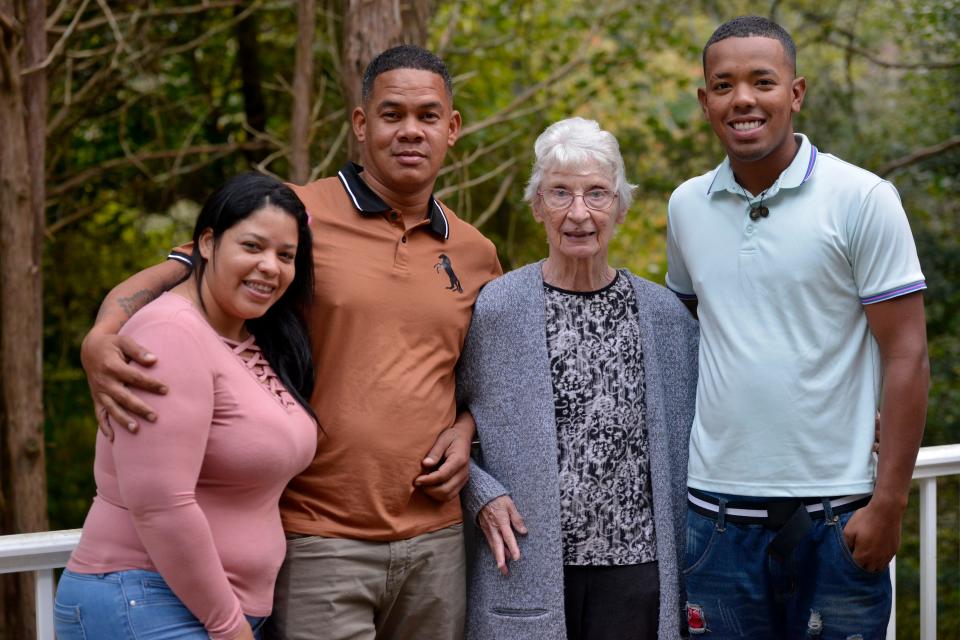
"In the moment you try to do whatever you can, but you have to continue," said Katiuska, who spoke through a Spanish interpreter working with the Times.
Katiuska, Pedro, and two migrants who asked not to be named, currently live with Janet Abbott, who opened her Barnstable home to the group after they were sent from Texas to Martha's Vineyard on Sept. 13, 2022.
Through the Unitarian Church of Barnstable, Abbott was connected to Housing Assistance Corporation in Hyannis, which paired her with the migrants who were staying at Joint Base Cape Cod at the time.
'I acted impulsively — guided by my heart —not my head,' says Janet Abbott of Barnstable.
“I acted impulsively — guided by my heart — not my head. And it has worked out very well,” she said.
Living with Abbott, Katiuska finally feels safe. For the last year, she said she's been healing from a traumatic journey, and events surrounding her transport to Martha's Vineyard. "When we got off the plane, there was a lot of fear," she said. "We were in the eye of a storm."
Why are Venezuelans seeking asylum?
The journey from Venezuela to the United States took two and a half months for Katiuska and Pedro, who was a Venezuelan police officer.
"Earnings were not even enough to eat. We couldn’t buy gas," said Katiuska. "It was hard to survive."
Pedro said their combined salaries had been enough to live comfortably under President Hugo Chavez. But after he died from cancer in 2013, Venezuela's economy plummeted igniting a socioeconomic and political crisis.
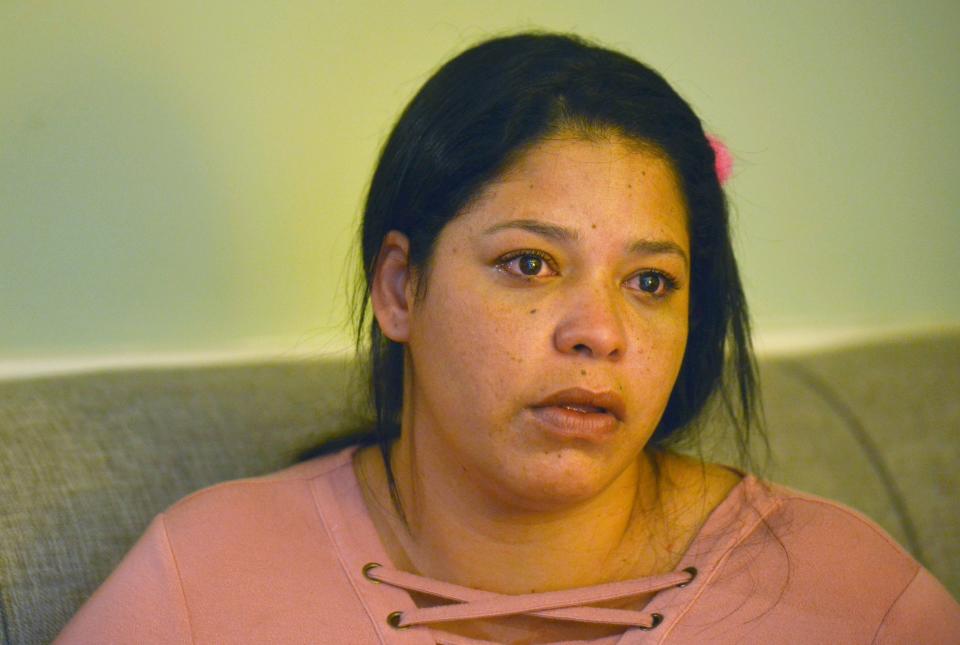
As the atmosphere became increasingly violent, the couple decided to leave. Pedro declined to provide dates of when they left, but he said the military had begun ordering Venezuelan police to invade the streets and area pueblos.
"We were ordered to shoot the citizens of the town," he said. "We didn’t want to do that. It wasn’t necessary to do something as low as that."The couple packed water, canned food and bread, said Pedro and began trekking the roughly 2,733 miles to Texas through Central America and Mexico.
"There were some points when I didn’t feel fear — but vulnerability — yes," he said. "But I had to stay strong for my wife."
One of the migrants living in Abbott's house, who asked that his name not be used, was a student and human rights organizer in Venezuela. During a protest, the former student was severely injured by the Venezuelan military.
"I was left on the ground, almost dying," said the student. "I tried to (lodge) complaints of the treatment, but they (military) said they would kill my whole family."
After fleeing Venezuela, the student tried to settle in Cúcuta, Colombia, and then Medellín. However, he faced homelessness throughout his stay. "I started selling water to try to earn money to eat and get a roof over my head," he said. "I went a lot of days with hunger."
Eventually, the student decided to travel to the U.S.
"Little by little I get closer to the U.S. and finally I challenged myself to cross the Darien Jungle," he said.
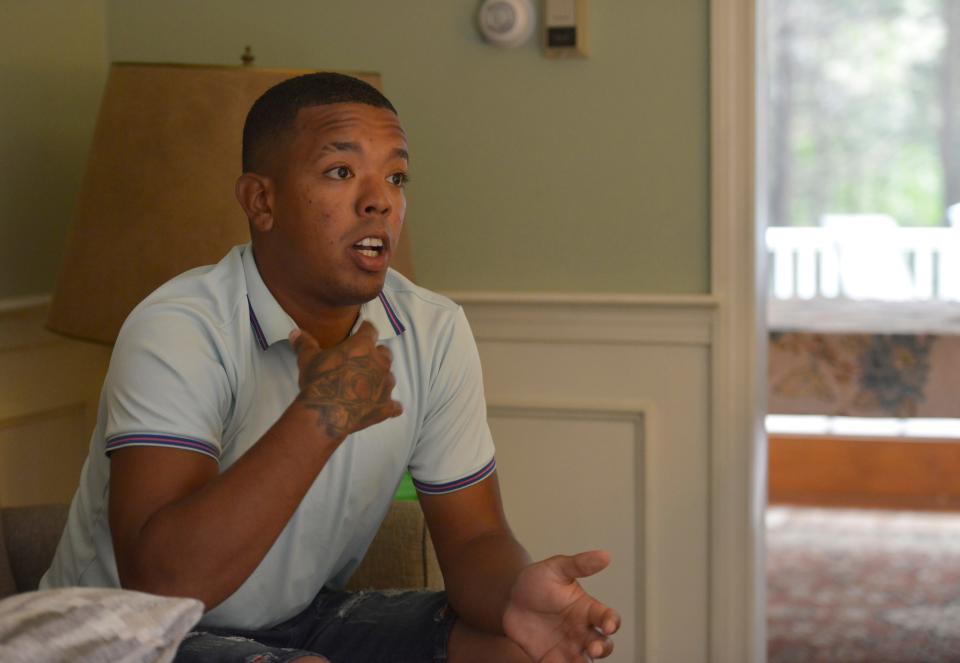
While they didn't know it, Katiuska and Pedro were just ahead of the student, who traveled through the jungle alone.
"I spent many days in the jungle and became lost along the way," said the student. "There were people that were suffering or dead — killed in front of me."
La Bestia (the beast): el Tren de la muerte (the train of death)
For Katiuska, the seven-day train ride through Mexico aboard La Bestia was one of the most dangerous parts of her expedition. La Bestia, which translates to "the beast," is a cargo freight train that runs from Chiapas in Mexico to the Lecherías station on the outskirts of Mexico City, according to Migration Policy Institute or MPI. On most days, men, women and children cling to the top of the train as it snakes its way through Mexico, said Katiuska. La Bestia, she said, stops for no one.
"We had to run for our lives and jump on," she said. "Pedro had to push me onto the train because that was the only way. If you don't make it on, you can (fall on the tracks and) die."The train eventually connected with a network of Mexican freight trains, heading to different points along the U.S. border. As the couple tried to figure out how to jump from one train to the next, they encountered a man who was so dismayed by his journey, that he decided to take his own life. Pedro talked him out of throwing himself on the tracks, said Katiuska. "The same way he appeared in front of us, is the same way he disappeared," she said. "We never saw him again. We don’t know what happened to him."
Before he disappeared, he gave the couple advice on what part of the train was safest.
"There's always someone good," said Katiuska.
Millions fled Venezuela
Michelle Mittelstadt, director of communications for MPI, said economic instability and violence increased in Venezuela in 2019, due to a dispute over the presidential election between socialist candidate Nicolás Maduro and opposition leader Juan Guaidó. While the Venezuelan Supreme Court upheld Maduro as the winner, Venezuela's National Assembly disagreed. Guaidó took the oath of office and was running the government in exile. He eventually relinquished his claim to the presidency in 2023. "There was significant political repression at times, including the use of detention, and actions by law enforcement agencies against people who were viewed as critics of the Maduro government," she said. "There have also been efforts to silence dissenters."
Throughout the conflict, the Maduro government significantly mismanaged Venezuela's economy, said Mittelstadt. Venezuela was a major exporter of crude oil but because of the government's economic fumbles surrounding the country's extractive and refining capacity, Venezuela lost oil as an underpinning of their economy. Ongoing sanctions imposed on Venezuela by the U.S., said Mittelstadt has also contributed to the failure of the country’s economy. "People will tell you that the sanctions have nothing to do with implosion. Others say it's responsible for everything," she said. "I would say it’s a piece of the puzzle that has led to an unraveling of the Venezuelan economy." With economic and political instability, access to health care, medicines, food and other basic supplies, came under significant threat, she said.
Since 2015, said Mittelstadt, about 7.7 million people have fled Venezuela. About 6.5 million of those Venezuelan refugees and migrants remain in Latin American and Caribbean nations.
"The (surrounding) countries have been remarkably generous without a lot of fuss, but this is the absorption of very large populations in not a lot of time," said Mittelstadt.
As America accepts Venezuelan asylum seekers, Mittelstadt said the U.S. government, in some ways, has been generous by granting Temporary Protective Status designations. The U.S. Department of Homeland Security also created the Cuban, Haitian, Nicaraguan and Venezuelan (CHNV) program. The initiative allows these four groups to receive immediate parole to enter the U.S. as long as they arrive on a plane and have a family member in the U.S. who can sponsor them.
As Venezuelans become the second largest flow of migrants arriving at the Mexican and Texan border, the U.S. government has announced deportation flights to Venezuela, Mittelstadt said.
On a state level, Sen. Julian Cyr said Gov. Maura Healey declared a state of emergency in August due to a sharp increase of migrants coming to the state. Healey expanded the Emergency Shelter Program to coincide with the state's “Right to Shelter” law for families with children, pregnant women and migrants.
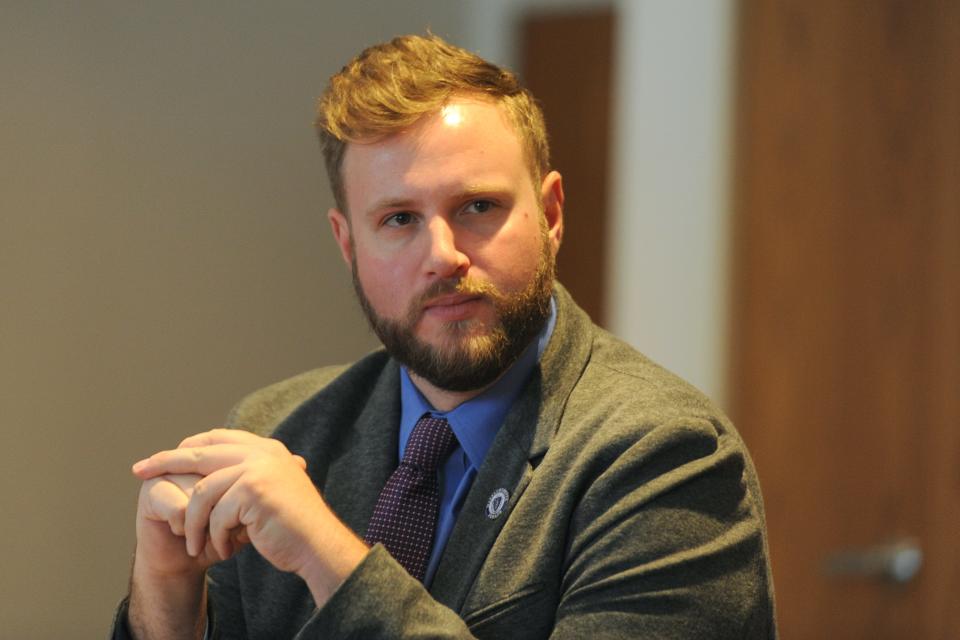
"It's important that people remember that ESP (Emergency Shelter Program) is only available to families with children under (the age of) 21 and families who are here legally," he said.
Yarmouth and Bourne are among 78 communities across the state providing shelter to migrant families, said Cyr. A total of 28 migrant families have been placed in Cape Cod hotels and motels since late August.
"Is it sustainable? No," said Cyr. "But we are doing the best we can in a very difficult situation."
Massachusetts, said Cyr, is grappling with a "decade in the making" housing crisis and the consequences of failed federal immigration policies and inaction surrounding antiquated immigration policies.
La Frontera: the U.S. border
After exiting La Bestia, it took four days for Katiuska and Pedro to walk to Piedras Negras, a Mexican town on the Rio Grande just across from Eagle Pass, Texas.
They then made their way to San Pedro 7000, a makeshift shelter for migrants in San Antonio, Texas, where they were processed as asylum seekers by border control and released.
The student was also processed, but not before he crossed the Rio Grande. "I tried four times to cross that river. It had very strong currents," said the student. Once he made it to the mainland, he was detained by border patrol for many days, he said. Border patrol agents took his DNA and fingerprints, and verified and created a profile identity for him before he was released.
At San Pedro 7000, a woman who called herself "Perla," recruited the four migrants, along with 44 other Venezuelan asylum seekers, and brought them to a hotel. They weren't allowed to use their phones or leave the premises, said Katiuska. At that time, they were also given papers to sign. The documents were written in English, and they were told the papers were for meal tickets.
"We found out later that they were papers that allowed them to transport us from Texas to Martha's Vineyard," said Katiuska.
Perla also promised jobs in America, legal services to help with the immigration process and airplane rides to the city of their choice. Katiuska and Pedro said they were headed to New York, while the student hoped to fly to Miami.
After two days at the hotel, the group was placed on a plane, said Pedro. A woman named Emily and a man whose name he couldn't remember accompanied the 48 on the aircraft, which made three fuel stops between Texas and Martha's Vineyard."When we got off the plane on Martha's Vineyard, they put us into small buses. They told us to wait for them. Nobody ever came back," said Pedro. "They took the plane back to wherever they came from."
The good thing, he said, is that islanders came to support the group in less than an hour.
"Firemen, police, teachers — people were helping us," he said.
Venezuelan migrants make a home but what are the challenges?
Venezuela is still enduring political and economic turmoil. But there's also political oppression and economic challenges in Cuba, Nicaragua and the collapsing state of Haiti, said Mittelstadt.
“The majority of them are not coming to the U.S. but the perception by Americans is that all of this migration is coming this way. That’s really not the case,” she said.Something particular to Venezuelans, is the absence of pre-existing ties in America, said Mittelstadt. Other immigrant groups such as Chinese migrants join family members or friends who have already come to the U.S. and established themselves.
"That means a lot of bootstrapping and learning from scratch,” she said.
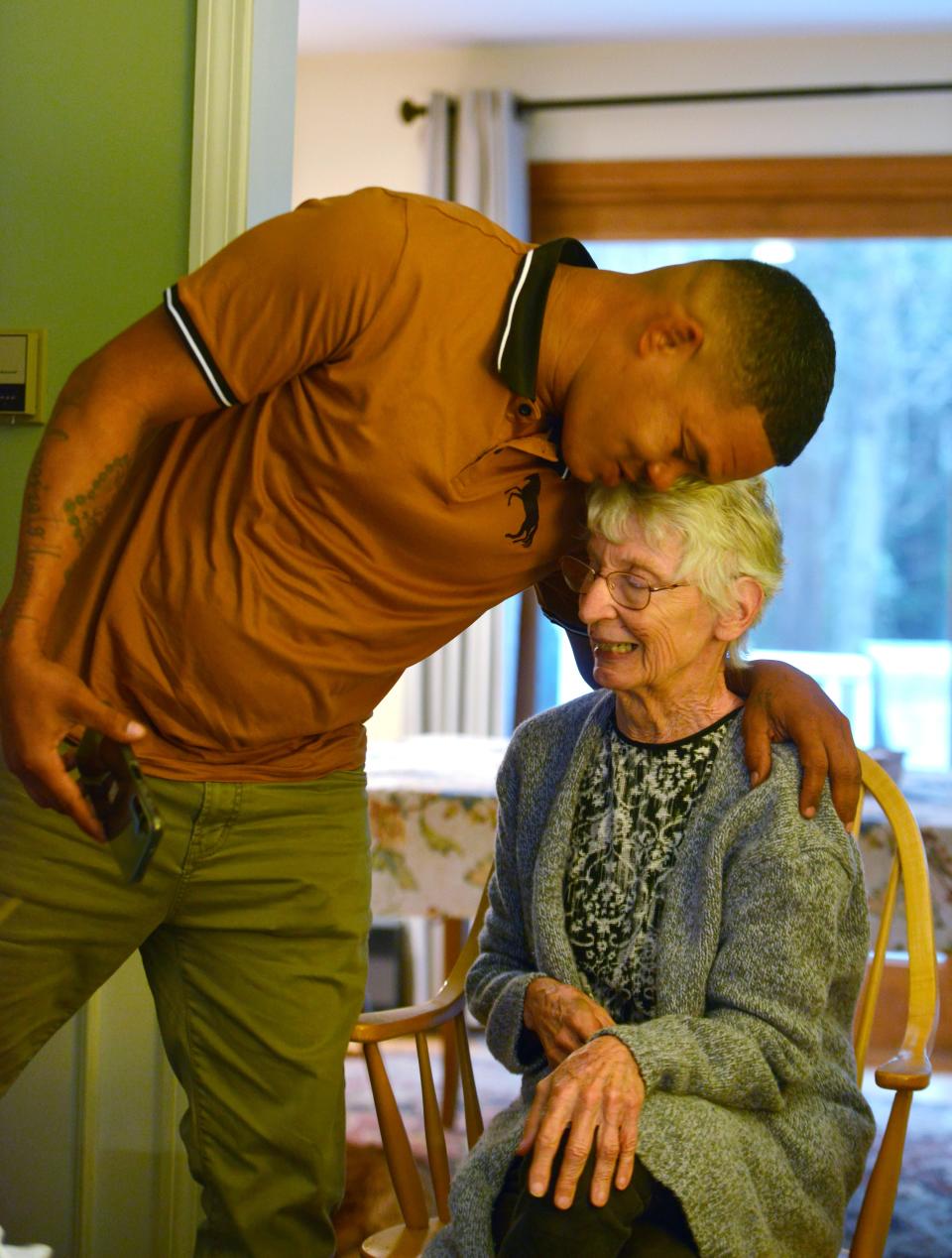
The idea surrounding immigration is skewed in America, Mittelstadt said.
'People don't migrate for the fun of it'
"People don't migrate for the fun of it," she said. "Migration is completely upending your life. There are deep factors that are often pushing them to this country."
Will the migrants remain on Cape Cod?
Since moving in with Abbott, both Katiuska and Pedro have secured work permits, while the student is still waiting for his. Katiuska didn't reveal where she works, but Pedro said he's a mechanic. He also installs car stereos as a hobby. All four also take English classes three days per week.
Katiuska said they are grateful for the Cape's hospitality, but said she rarely reveals that she is one of the 48 migrants who landed in Martha's Vineyard.
"It’s going to take a long time to rebuild trust after what they’ve been through," said Abbott.
'We believe this is a country filled with love.'
Katiuska has only one regret: leaving her seven children behind with a family member. Tears formed in her eyes when she thought about how difficult the journey would've been for them. "If it (the trip) was so difficult for me, I can’t imagine what it would have been like for my kids," she said. "I feel it would have been irresponsible for me to bring them."
Since arriving on the Cape, the student has grappled with the lies he was told by Perla, Emily, and the unknown man. It affected him psychologically, he said. Regardless, he considers Cape Cod a place filled with opportunity.
"For so long it was either live or die," he said. "But now we are here to fight for our future. And be part of society. We believe Cape Cod is a place where people are very nice. We believe this is a country filled with love."
Rachael Devaney writes about community and culture. Reach her at rdevaney@capecodonline.com. Follow her on Twitter: @RachaelDevaney.
The Cape Cod Times mobile app gets you to the heart of the matter — fast. Whether breaking news, sports, entertainment or weather get succinct, personalized coverage along with award-winning videos, captivating photography, and interactive user features. Download the app.
This article originally appeared on Cape Cod Times: Four migrants flown from Texas to Martha's Vineyard tell their stories

